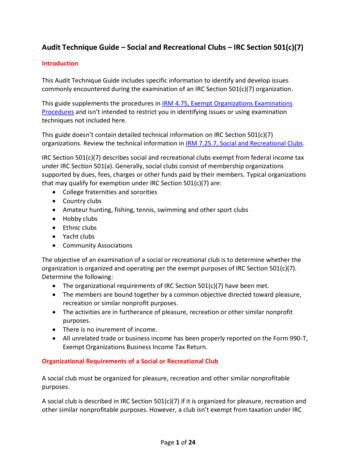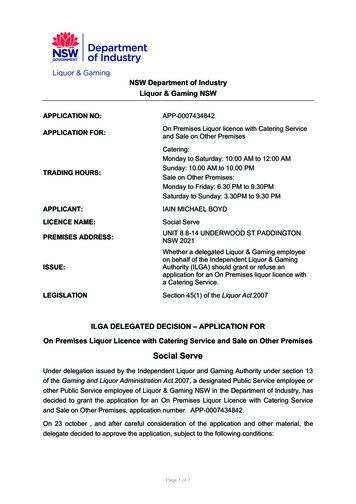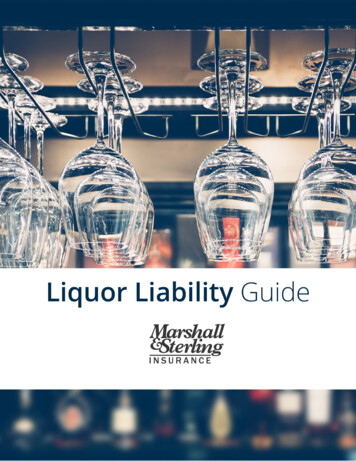
Transcription
Understanding Liquor Liability.3What is Liquor Liability? .3Who is at Risk? . 3The Legal Basis for Liquor Liability .3Dram Shop Liability Laws.4Negligence Laws . 5What Can Go Wrong? . 5Mitigating Liquor Liability Through Risk Management . 5Assess Your Risks . 5Take Steps During the Hiring Process . 5Provide Training to Staff.6Promote Safety and Sobriety at Company‐sponsored Events . 7Additional Steps . 7Steps to Help Control and Reduce Liquor Liability Claims. 7Document All Incidents . 7Work With Third‐party Vendors .7Create a Written Policy . 8Liquor Liability Insurance . 8What is Liquor Liability Insurance? . 8What Determines Pricing? .9Find the Right Policy .10Employee Liquor Liability Agreement Form . 12Liquor Liability Incident Report. 13Liquor Liability Policy .14Purpose . 14Scope . 14Responsibilities When Serving Alcohol to Patrons . 14Responsibilities When Serving Alcohol to Employees at Company Events . 14Responsibilities When Consuming Alcohol at Company Events . 15This toolkit is not intended to be exhaustive nor should any discussion or opinions be construed as legal advice.Readers should contact legal counsel for legal advice. 2017 Zywave, Inc. All rights reserved.
3Understanding Liquor LiabilityBusinesses that serve alcohol expect their employees or patrons to have a good time and act in aresponsible manner. What they don’t expect, however, is to find out that they are liable for the actionsof an intoxicated person. While the vast majority of businesses serve alcohol without incident, the harshreality is that lawsuits related to liquor liability are filed each day. Making matters worse, all it takes is asingle liquor liability claim to put your entire business at risk.To help your business navigate the risks associated with serving alcohol, this guide will examine theconcept of liquor liability and list steps businesses can take to mitigate their risks of facing a costlylawsuit or insurance claim.When you are done reviewing this guide, remember, Marshall & Sterling, Inc. is here for you and yourbusiness. We are ready to help you design an effective risk management plan to limit your business’sliquor liability. What’s more, we can help you find the right insurance policy to protect your business’sbottom line.What is Liquor Liability?The term “liquor liability” refers to an organization’s legal and financial responsibility for the actions of aperson who consumes alcohol at its establishment and the consequences of those actions. Under liquorliability laws, businesses can be held liable for bodily injuries and property damage caused by a personwho was served alcohol at their establishment.According to the Insurance Information Institute, liquor liability is not limited to those whose primarybusiness is the sale of alcoholic beverages. Your business may have a liquor liability exposure if you doany of the following: Sell or distribute alcohol at your place of businessAllow patrons or guests to bring their own alcohol and consume it that at your place of businessServe alcohol at an event you are hostingAllow others to serve alcohol at your venueWho is at Risk?When it comes to liquor liability, a wide range of organizations and individuals can face a lawsuit. Beloware some of the most common defendants in alcohol‐related lawsuits: Owners of restaurants, bars and nightclubsOwners of retail stores and convenience stores that sell alcoholBusinesses and nonprofits that host company parties or social eventsHomeowners who host partiesCollege and university organizations that serve alcoholThe Legal Basis for Liquor LiabilityIn the United States, dram shop laws and negligence laws form the legal basis for liquor liability. What’smore, each state has specific regulations for the sale and distribution of alcohol. In order to take theappropriate steps to control their risk, it is important for businesses to know the laws in their state and
4local jurisdiction. For added guidance, refer to the website of the Alcohol and Tobacco Tax and TradeBureau, which provides links to each state’s alcoholic beverage authority.Dram Shop Liability LawsDram shop liability laws exist in 43 states and allow third parties injured by an intoxicated person to suea business for contributing to that person’s intoxication. For example, if an intoxicated patron leavesyour establishment and then causes an auto accident, you could be sued for damages. The same appliesfor any injuries that occur on your property that are caused by intoxication.While dram shop laws vary from state to state, typically businesses can be liable if they do any of thefollowing: Sell or serve alcohol to minorsSell or serve alcohol to a patron who is visibly intoxicatedSell or serve alcohol to someone who is habitually drunkIn general, businesses must comply with dram shop laws if they do any of the following: Sell alcohol in a commercial capacity (e.g., bars, restaurants and liquor stores)Host events where alcohol is consumed (e.g., company parties)Furnish or serve alcohol in a commercial capacity (e.g., catering companies)Allow patrons to bring their own alcohol and drinks to the establishment (e.g., restaurants andbanquet halls)To learn more about dram shop laws in your state, please visit the National Conference of StatesLegislatures’ webpage on dram shop civil liability and criminal penalty state statues.
5Negligence LawsEven in situations where a dram shop law is not applicable, businesses can still be held liable for alcohol‐related incidents. All 50 states have negligence laws that can hold businesses responsible for alcohol‐related incidents if their actions do not align with what a reasonable person would have done in asimilar situation.What Can Go Wrong?When it comes to alcohol‐related incidents, there is no shortage of things that can go wrong. Below is anoverview of the wide range of injuries and damages for which a business can be held responsible forunder liquor liability laws. These incidents can lead to costly judgments against your business, forfeitureof your liquor license or even criminal proceedings: Drunk driving incidents—Businesses can be held liable for the damages created by drunk driverswho were inappropriately served.Fighting—Fights and assaults are among the most common causes for liquor liability claims.Sexual assault and harassment—Businesses can be at fault if someone becomes intoxicated attheir establishment or event and sexually assaults or harasses another individual.Trips, slips, falls and other accidents—If these incidents occur as the result of alcoholconsumption, a business may face a premise liability claim.Alcohol poisoning—The overconsumption of alcohol is all too common. In some cases,overconsumption can lead to alcohol poisoning, a common source of liquor liability claims.Mitigating Liquor Liability Through Risk ManagementWith all of the risks associated with liquor liability, some business owners may question whether it iseven worth it to serve alcohol. While some incidents are unavoidable, a proper risk managementprogram can greatly reduce the chances that a business will face a liquor liability claim. In this section,we will explore the aspects of a sound risk management program.Assess Your RisksWhen implementing a risk management program for liquor liability, it is important to understand thenature of your business. Having a sense of how frequently your business serves alcohol, and in whatmanner, can help guide your business in the right direction. For example, the risk managementprocesses that a bar or restaurant implements may differ from the actions of a business that only servesalcohol from time to time.Take Steps During the Hiring ProcessIf your business frequently serves alcohol, it is important to be upfront with perspective employeesabout what will be expected of them. Employers should consider taking the following steps: Inform applicants that your establishment takes responsible alcohol service seriously.Let applicants know about business policies and state laws related to the service of alcohol.Screen applicants for past violations of selling, serving or supplying age‐restricted products tominors.
6 Ask applicants to role‐play or demonstrate how they would respond to situations such as minorsattempting to be served alcohol, someone who does not have an ID to show proof of age or anintoxicated individual who wants to purchase alcohol.Provide Training to StaffIt is especially important to provide ongoing training for any employees who serve alcohol. At aminimum, your employee training should address the following: State and local liquor laws and requirementsHow to verify age and recognize false identificationThe signs of intoxication or alcohol impairmentIndicators for when someone may be purchasing alcohol for minorsHow to refuse service and manage difficult situationsThe process for documenting incidentsA consistent method of measuring and serving alcoholic drinksWhen and who to turn to for assistanceThe consequences of not following policySome individuals may become belligerent, hostile or combative when intoxicated. If employees refuse tosell to intoxicated individuals, it is important for management to support their decision and be ready toprovide support, including escorting a patron from the premises, arranging for transportation or callingthe police, if needed.
7Promote Safety and Sobriety at Company‐sponsored EventsTo promote the safety and sobriety of your employees and guests at company‐sponsored events, reviewthe following recommended control measures: Make attendance optional if alcohol will be served at the event.Serve drinks to guests rather than offering a self‐serve bar.Set up bar stations instead of having servers circulate the room. If offered, people are inclined toaccept drinks they wouldn’t have otherwise ordered.Place signs at each bar reminding employees and guests to drink responsibly.Don’t price alcohol too low, as it encourages overconsumption.Offer a range of low‐alcohol and alcohol‐free drinks at no charge.Require servers to measure spirits.Always serve food with alcohol.Close the bar an hour before the scheduled end of the party.Do not offer a “last call,” as this promotes rapid consumption.Never raffle alcohol or hold contests that involve buying or drinking alcohol.Entice guests to take advantage of safe transportation options by subsidizing taxis or promotinga designated driver program.Additional StepsBusiness can also take the following steps to help control their establishment and reduce liquor liabilityclaims: Design or alter the layout of your establishment in ways that enhance your staff’s ability tomonitor patrons’ activities and alcohol consumption. Ensure employees can see all sections of your establishment clearly. If possible, install mirrors orsurveillance equipment to assist in monitoring corners, hallways or other areas where illegalconsumption or other problem behaviors may occur. Ensure that temporary displays, decor and service areas will not impede employees’ views ofany areas where patrons are consuming alcohol. Encourage staff to make themselves visible and to speak to anyone hanging around or actingsuspiciously. Have policies and procedures in place to ensure inventory is monitored and secured. Utilize signage at doorways and other visible areas to make it clear that you uphold liquor lawsand will cooperate with law enforcement to address crimes and disruptive behavior.Document All IncidentsIf an incident occurs, complete a liquor liability incident report documenting the measures taken tocontrol the intoxicated person. This report can aid in your defense if an alcohol‐related accident occurs.Work With Third‐party VendorsYour risk management program should also include recommendations when working with third‐partyvendors, such as the following:
8 Verify that all vendors you work with, such as a caterer or bartender service, are licensed andinsured.Stipulate in your vendor’s contract that only those who have received alcohol‐awarenesstraining should serve or sell alcohol at your event.Require the vendor to provide a certificate of liability insurance that includes liquor liabilitycoverage, naming your company as an additional insured.If alcohol will be sold or served by outside caterers or bartenders, consider requiring them to carrygeneral liability, products‐completed operations and liquor liability insurance with appropriate limits.You should be listed as an additional insured on these polices and require the contractor to provide acertificate of insurance confirming these requirements.Create a Written PolicyOnce you have identified the risk management steps your business will take, it is important to documentthose steps in a written policy. This policy will ensure that your employees know what is expected ofthem at all times and demonstrates to insurance companies that you take liquor liability seriously.Liquor Liability InsuranceUnfortunately, even the best risk management programs can never eliminate your liquor liabilityexposures completely. To make matters worse, people often file lawsuits against businesses that doeverything in their power to serve alcohol in a responsible manner. When these lawsuits occur, they canbe expensive with costs often exceeding 10,000 for legal fees alone. Thankfully, businesses can turn toliquor liability insurance.What is Liquor Liability Insurance?Liquor liability insurance protects businesses that manufacture, sell or serve alcohol, against claims thatoccur when a patron drinks too much and injures themselves or someone else. It is meant to protect anyestablishment that serves alcohol in any form from damages caused by an inebriated patron. Liquorliability insurance covers damages caused by alcohol‐related incidents when a commercial generalliability policy does not.Liquor liability insurance also helps businesses afford the high cost of a liquor liability lawsuit. Policiescan be used to pay for expenses such as: Lawyers’ feesSettlementsJudgmentsDamages and other court feesExplained another way, if a business is accused of violating a liquor liability law, and that supposedviolation causes a loss for someone, a liquor liability insurance policy can cover the cost to makeamends.Liquor liability polices can only protect your business from the costs that develop out of covered alcohol‐related incidents listed in your policy. Every policy varies, but most liquor liability policies cover thefollowing:
9 Property damage caused by an intoxicated individualPersonal injuries caused by an intoxicated individualMental damagesEmployee incidentsWhen alcohol is involved, fights are a common risk. However, many liquor liability policies excludecoverage for assault and battery. Therefore, it’s important to account for this protection when buildingyour policy. It should be noted that assault and battery coverage can also be extended to include specificincidents such as sexual assault, stabbings and shootings.It should also be noted that liquor liability insurance won’t cover claims that arise from the sale ofalcohol to minors or similar illegal transactions. Be sure your employees are instructed to verify patronsare of a legal drinking age.What Determines Pricing?The underwriting process for liquor liability insurance can differ depending on the type of business youconduct. In general, the following four factors determine the rating and pricing of coverage:1. Type of venue—When examining a business’s risk, underwriters look to identify the primarypurpose of a venue. If you own a restaurant, the primary purpose of your venue is to serve food,so you are generally considered to have less risk than a nightclub or tavern.2. Location of the venue—Liquor laws can vary drastically depending on the jurisdiction. Eachstate has its own scoring system based on the nature of local dram shop laws. Dram shop lawsimpose certain liability standards on area venues that serve alcohol. Because the strictness ofthese laws may change from location to location, where you operate your business can have amajor impact on how your liquor liability insurance is priced.3. Percentage of liquor sales—As a general rule, the more alcohol sales you make, the higher yourpremiums will be. This factor tends to have more of an impact on pricing than venue type, as arestaurant that has a high percentage of alcohol sales may be priced similar to a bar.
104. Individual traits of the risk—There are a number of miscellaneous variables underwriters takeinto consideration when pricing out policies, including the following: Types of entertainment offeredExperience level of managementFormal loss‐control measuresSecurity measures and procedures for dealing with intoxicated patronsFind the Right PolicyConsult Marshall & Sterling, Inc. today to learn more about how liquor liability can be used to protectyour business. We have the expertise to help you mitigate your risks and protect your bottom line.
Employee Liquor Liability Agreement FormAs a condition of employment at , I agree to the following company rules regarding the sale and distribution ofalcoholic beverages:1.I have completed ’s formal Liquor Liability Training Program. Any questions I had regarding theprogram have been fully explained to my satisfaction.2.I will not sell beer, ale, wine or liquor to any person that is not of legal drinking age at the time of thesale.3.I will not sell any beer, ale, wine or liquor to any person who appears intoxicated or is acting disorderly.4.I understand the state, county and city laws regarding the legal hours of the day during which I may sellbeer, ale, wine or liquor to a customer. I will not sell or serve beer, ale, wine or liquor to anyone duringthe restricted hours.5.I will not purchase any beer, ale, wine or liquor from my employer for the use or benefit of any underageperson or any intoxicated person.6.I understand will only accept certain forms of personal identification as outlined in my training program,and I will accept no other form of identification from anyone purchasing beer, ale, wine or liquor.7.If any customer does not clearly appear to be at least 30 years old, I will request acceptableidentification and verify that the customer is of legal age before making the sale.8.I understand that if I do make an illegal sale of beer, ale, wine or liquor, I may be personally arrestedand charged with a criminal offense. If I am found guilty, I could be fined, jailed or both. I understand Iam personally responsible for my attorney fees as well as paying any fines.9.I understand that any infraction of my employer’s rules concerning the sale of beer, ale, wine or liquorcould result in automatic termination.10.I understand that my activities will be monitored by as well as by state and local law enforcementinvestigators.I have read, understand and agree to comply with the liquor liability policy rules as stated above.Employee SignatureDate12Provided by Marshall & Sterling, Inc. 2006 Zywave, Inc. All rights reserved.
LIQUOR LIABILITY INCIDENT REPORTIn the event of an incident:1.Record all relevant information surrounding the potential claim in the form provided below. This includesdenying entry to anyone who is intoxicated, refusing service, ejecting patrons, rejecting use of false ID, andrecording an accident or altercation. Include the name of alleged intoxicated person and contact informationof any witnesses, staff or volunteers that were present or have information relevant to the incident.2.Once a claim or potential claim is identified, immediately contact your Marshall & Sterling representative.3.Refer any discussions with the claimant (injured party) to Marshall & Sterling. Do not discuss or admit liabilitywith potential claimants.Establishment name:Date:Name of alleged intoxicated person(s) or person(s) injured:Arrival time:Departure time:Brief description of incident/complaint:Intervention strategies used:Bartenders/servers on staff:Witness name(s):Address(es):Telephone number(s): HomeMobileAuthorities contacted? Yes No If yes, whom:Additional comments: Please note any relevant facts that you are aware of regarding the alleged intoxicated person,injury, or property damage or loss.Prepared by:Position:Date:Provided by: Marshall & Sterling, Inc. 110 Main Street Poughkeepsie, NY 12601 (845) 454-0800 www.marshallsterling.com13 2006, 2012 Zywave, Inc. All rights reserved.
Location:Liquor Liability PolicyEffective Date:Revision Number:PurposeFor the safety of all employees and patrons, requires all employees to adhere toresponsible practices when serving and drinking alcoholic beverages. After reading this policy, employees will understandthe following:-To whom alcohol can be servedWhen alcohol can be servedThe amount of alcohol that can be servedResponsible practices for serving and drinking alcohol during company eventsScopeThis policy applies to all employees who serve alcohol, as well as to employees who consume alcohol at companysponsored events, both on-site and away from property.Responsibilities When Serving Alcohol to Patronsis responsible for ensuring that employees and patrons abide by all state and local lawsregarding the service of alcohol. In an effort to promote compliance and safety, expects allemployees to follow company policy. Failure to do so may result in disciplinary action, up to and including termination.expects employees to adhere to the following rules when serving alcohol to patrons:- Refuse service of alcohol to any person under 21 years of age or to any person who appears visibly intoxicated.- Require any patron who appears to be under 30 years of age to present government-issued photo identification withhis or her date of birth indicating that he or she is at least 21 years of age. If the identification appears to be forged ortampered with, the employee checking the identification should inform his or her manager.- Immediately notify a manager or supervisor when a patron shows visible signs of intoxication. The manager orsupervisor should then inform the patron that it is not legal to continue service of alcoholic beverages.- Urge any patron showing visible signs of intoxication to avoid driving home. If the intoxicated patron drives away, theemployee should note the patron’s license plate number and contact local law enforcement.- After refusing service to any patron, an employee should note the patron’s appearance and clothing on an incidentreport, which should be given to and recorded by his or her manager.- Dispense all alcohol in measured quantities.- Use good judgment concerning the number of drinks served at a time.- Participate in a designated alcohol-awareness training program within one month of beginning employment.Responsibilities When Serving Alcohol to Employees at Company Eventsmay enlist the help of employees when serving alcohol at company-sponsoredevents. Employees who agree to serve alcohol at company events are expected to follow all aforementioned rules as wellas the following:- Obtain executive approval before hosting a company event. The executive should be present during the entire event.- Limit the number of alcoholic drinks served to two per guest.14Prepared by Marshall & Sterling, Inc.This liquor liability policy is a guideline only. It is not meant to be exhaustive or construed as legal advice. Consult your legal counsel to addresspossible compliance requirements. You should customize a policy for your own company use. 2017 Zywave, Inc. All rights reserved.
- Serve alcohol over a time period of no more than two hours.- Offer food during the time period that alcohol will be served to limit intoxication.- Provide transportation options to employees who cannot safely drive home.Responsibilities When Consuming Alcohol at Company Eventsmay sponsor company events during which alcohol is served. In an effort to promoteresponsible alcohol consumption at all company-sponsored events, requires employees tofollow the guidelines listed below:- Behave in a professional manner and follow all company policies.- Avoid alcohol if you are under 21 years of age.- Arrange for a safe ride home if you have had too much to drink.- Ensure that guests abide by all company policies. If your guest shows signs of intoxication, do not allow him or her anymore alcohol.15
Dram Shop Liability Laws Dram shop liability laws exist in 43 states and allow third parties injured by an intoxicated person to sue a business for contributing to that person's intoxication. For example, if an intoxicated patron leaves
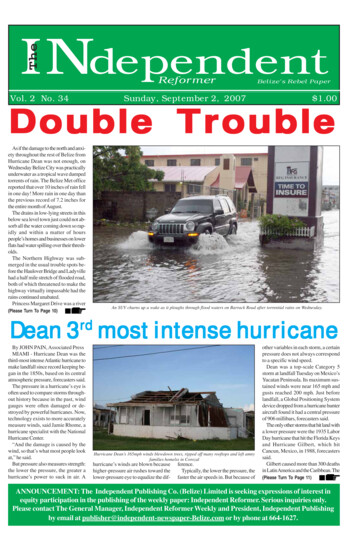
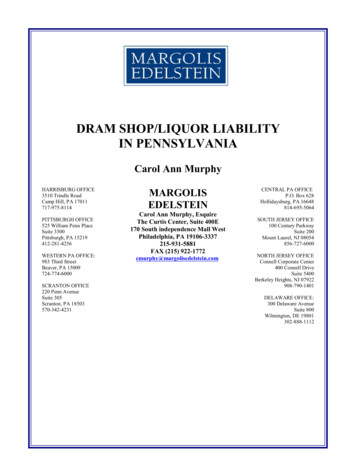
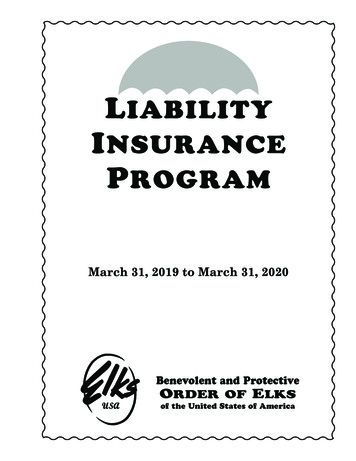
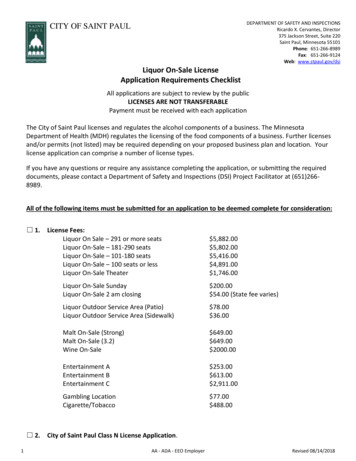
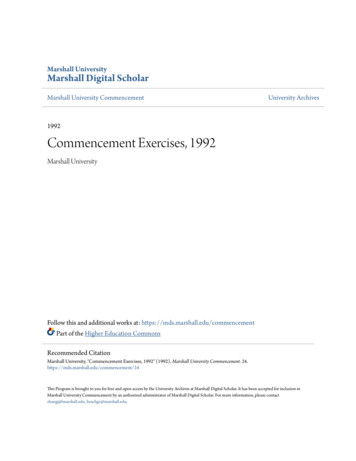
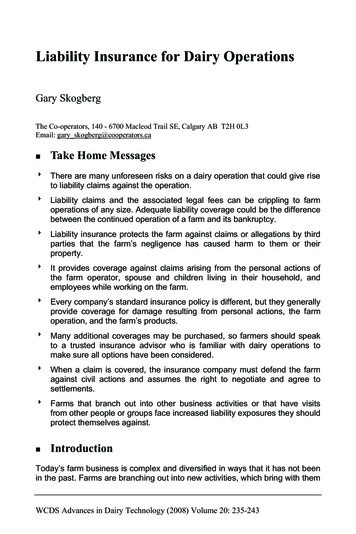
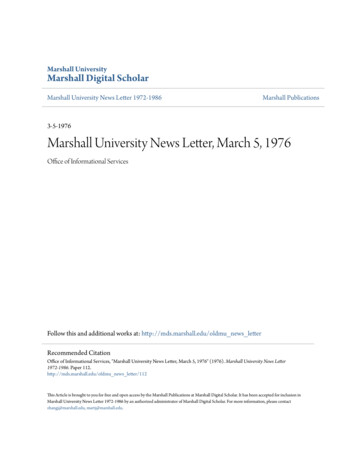
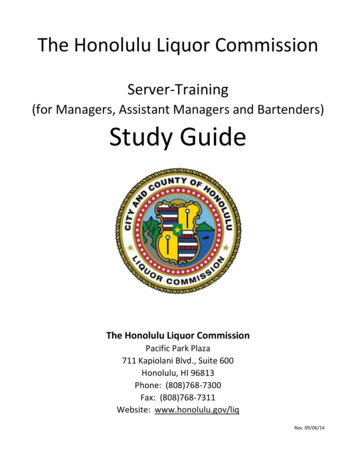
![Liquor Act [No. 59 of 2003] - Gov](/img/35/a59-03.jpg)
